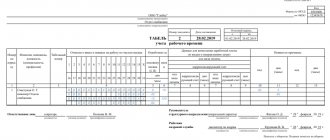There are no regulatory differences between the procedure for sending an internal part-time worker on a business trip for the main position or for the part-time position.
Moreover, if an employee goes on a business trip for both his main job and part-time work, when calculating average earnings, payments for both positions are taken into account, otherwise payments for one position specified in the business trip order are taken into account.Filling out the work time sheet also depends on the position for which the employee is sent on a business trip.
Part-time work is the performance by an employee of another regular paid job under the terms of an employment contract in his free time from his main job. An employee has the right to enter into employment contracts to perform other regular paid work with the same employer (internal part-time work) in his free time from his main job (Article 60.1, 282 of the Labor Code of the Russian Federation).
A business trip is understood as a trip by an employee by order of the employer for a certain period of time to carry out an official assignment outside the place of permanent work (Article 166 of the Labor Code of the Russian Federation).
The Labor Code of the Russian Federation contains a certain list of cases when the employer does not have the right to send employees on business trips (Articles 203, 259, 268 of the Labor Code of the Russian Federation). However, part-time work is not listed among them. Consequently, an internal part-time worker can be sent on a long business trip.
When an employee is sent on a business trip, he is guaranteed to retain his place of work (position) and average earnings, as well as reimbursement of expenses associated with the business trip (Article 167 of the Labor Code of the Russian Federation).
If sent on a business trip, the employer is obliged to reimburse the employee (Part 1 of Article 168 of the Labor Code of the Russian Federation): travel expenses; expenses for renting residential premises; daily allowance; as well as other expenses incurred by the employee with the permission or knowledge of the employer.
The basis for sending an employee on a business trip may be an order. Also, the list of documents that are the basis for sending on a business trip can be established by an internal act of the organization.
Before leaving, the employee must be given an advance for travel expenses (clause 10 of the Regulations on the specifics of sending employees on business trips, approved by Decree of the Government of the Russian Federation of October 13, 2008 N 749 (hereinafter referred to as Regulation N 749)).
Is it possible to send an internal part-time worker on a business trip?
The Labor Code contains a closed list of conditions and circumstances under which the employer does not have the right to send employees on business trips. They are given:
- in Article 203 of the Labor Code of the Russian Federation - during the period of validity of the apprenticeship contract, employees cannot be sent on business trips not related to the apprenticeship;
- Article 259 of the Labor Code of the Russian Federation - it is prohibited to send pregnant women on business trips;
- Article 268 of the Labor Code of the Russian Federation - it is prohibited to send workers under the age of 18 on business trips.
Thus, internal part-time work is not an obstacle to sending an employee on a business trip.
Note. General guarantees for posted workers
When sending an employee on a business trip, he must be provided with guarantees and compensation provided for in Articles 168 and 167 of the Labor Code of the Russian Federation, namely:
— maintaining a place of work (position);
— maintaining average earnings;
— reimbursement of expenses related to business travel.
Is it possible to travel on business
Many enterprise employees work in two or more jobs at the same time. The main job and part-time work differ in that the first involves the implementation of the main activity, and the second - the performance of other functions in free time. Both managers and employees are concerned with questions: is it possible to send a part-time worker on a business trip, how to arrange it and pay for it?
There are no obstacles to sending a part-time worker on business, since the employee’s additional income does not in any way prevent him from traveling for business purposes. This is impossible only in exceptional cases (apprenticeship, pregnancy, etc.) described in Article 259 and the third part of Article 203 of the Labor Code of the Russian Federation. The employee must be informed about the appointment of a business trip to the second workplace and register his absence in a certain way.
Performing a business trip during the rest period
When working part-time, the duration of working hours should not exceed half of the monthly working hours. That is, the employee will not be able to perform job duties at a part-time job for a time exceeding 20 hours a week, four hours a day. This is stated in Part 1 of Article 284 of the Labor Code of the Russian Federation.
An internal part-time worker can work full-time (shift) only on days when he is free from performing work duties at his main place of work (Part 1 of Article 284 of the Labor Code of the Russian Federation).
During the period of a business trip, a part-time employee is exempt from performing labor duties at the main place of work, which means that he can perform a business trip assignment during a full working day.
Obviously, in this case, the part-time employee will perform a business trip outside of 4 working hours - during the time designated by the part-time work schedule for rest.
Main difficulties during registration and payment
The main difficulty that part-time workers sometimes face when sent on a business trip is the refusal of another employer to provide unpaid leave. It is worth noting that managers do not have the right not to provide such leave to some persons:
- Working pensioners: 14 calendar days per year.
- Disabled people – up to 60 days.
- Spouses and parents of military personnel – up to two weeks.
Thus, if the manager refused to grant leave due to a business trip to another place of work, and subsequently fired the employee for absenteeism, he can appeal such actions in court, because they are illegal.
If there are compelling reasons, an employee may refuse a business trip, but if the employment contract states that he must go on such trips in any case, they cannot be avoided.
The obligation to pay and reimburse expenses rests with the employer who sent the employee on a business trip.
Who should take care of solving problems with a part-time worker’s business trip?
When an external part-time employee is sent on a business trip, the solution to all problems that arise due to discrepancies in schedules and working hours in different organizations is assigned to him. As a rule, during the period of absence from his main job, he takes leave without pay (Article 128 of the Labor Code of the Russian Federation).
If an internal part-time employee is sent on a business trip, the employer is obliged to compensate him for all losses arising in this case.
Let's look at what it can do.
Business trip of an external part-time worker
The situation is more complicated when sending an employee who combines work in another organization with the main one.
Before traveling on the instructions of one manager, it is necessary to notify the other employer by presenting a copy of the business trip order. This must be done so that absenteeism is not marked on the report card, because the need to complete an official task (even if it is from another manager) is a valid reason.
This is exactly what an employee should do when sent on a trip from the main organization. That is, provide a copy of the order on the upcoming deployment to the place of second duty.
Then this employee will retain his job, but he will lose wages.
The option when an official assignment is received for a part-time business trip not for the main job is not profitable due to the loss of the main income.
But it is impossible to refuse if it is prescribed by the terms of the contract.
In addition, a conflict situation with the main employer may arise.
To avoid this, unpaid leave is usually booked and agreed upon. An excellent option may be the possibility of registering another leave of absence from your main position.
Example of an employee statement:
Part-time worker’s application for leave at his own expense
How to maintain income from two positions
If an employee is sent on a business trip only for part-time work, the employer is obliged to maintain his average earnings only for this position, because the law does not provide for the calculation of wages for the period when the employee does not perform job duties. However, in all cases when an employee is deprived of the opportunity to be at the workplace and (or) perform his labor (official) duties due to the fault (in our case, on the initiative) of the employer, his average earnings are also retained as a guarantee. This conclusion follows from Part 1 of Article 165 of the Labor Code of the Russian Federation.
Is it possible to send
A business trip is a trip on the instructions of the employer to perform certain activities, carried out on the basis of Article 166 of the Labor Code. The employer independently decides whether to give the employee an official task that needs to be completed away from the main place of work or not.
Expert opinion
Labor Lawyer Olga Smirnova
Some categories of workers may refuse to travel, or in principle cannot be sent on a business trip. However, registration as a part-time worker, as well as the presence of a second part-time job for the main employee, is not an obstacle. Therefore, a part-time employee (both external and internal) can be sent on a business trip to any of the places of employment.
Failure to fulfill labor duties due to the fault of the employer
In accordance with Part 1 of Article 155 of the Labor Code of the Russian Federation, in case of failure to comply with labor standards or failure to fulfill labor (official) duties, the employee is paid in an amount not lower than his average salary, calculated in proportion to the time actually not worked due to the fault of the employer.
By making a decision to send an employee on a business trip for one (combined) position, the employer simultaneously deprives the employee of the opportunity to fulfill the work standard (job responsibilities) for his main job. In other words, failure to comply with labor standards (failure to fulfill official duties) for the main job in the situation under consideration was due to the fault of the employer. Thus, during the period that an internal part-time worker is on a business trip, the employer must maintain his average earnings at his main place of work.
Calculation of average earnings saved for the period of a business trip at a combined place of work and for the period of non-fulfillment of official duties due to the fault of the employer at the main place of work is made according to uniform rules: based on the wages actually accrued to the employee and the time actually worked by him for the 12 calendar months preceding the period , in which the business trip began. This procedure is established in part 3 of article 139 of the Labor Code of the Russian Federation and paragraph 4 of the Regulations on the specifics of the procedure for calculating average wages, approved by Decree of the Government of the Russian Federation of December 24, 2007 N 922.
If business travel is prohibited
According to the Labor Law and the Regulations on Business Travel, there are no prohibiting factors for sending a part-time worker (external or internal) on a business trip. A part-time worker cannot be sent on a business trip provided that he belongs to one of the following categories:
- Pregnant.
- A subordinate who is under 18 years of age.
- He is on study leave.
If the person sharing the duties is not included in any of the groups, then he is obliged to go on a business trip, unless otherwise specified in the employment contract. How is a part-time worker sent on a business trip? It all depends on what kind of combination: internal or external. Also influenced by the place of work from which you are sent on a business trip.
The specifics of payment for a business trip depend on whether the employee is an internal or external part-time worker, and whether he is sent on a business trip from his main or additional place.
With internal alignment
When sending an internal part-time worker, the following scenarios are possible:
- Business trip to another city to complete assignments for primary and additional work.
- Business trip on assignment from the main place of work.
- Business trip as an internal part-time worker.
In the first option, the employee retains the average monthly salary in both enterprises while on a business trip, and travel allowances are paid once. At the end of the trip, two progress reports are drawn up. The second option provides for maintaining wages only at the main place of work, since there were no additional work activities.
The same approach to calculating wages remains for the third business trip option. There are some subtleties when preparing the timesheet, since the internal part-time worker could not perform his main duties due to a business trip at the initiative of management.
Art. 167 of the Labor Code of the Russian Federation guarantees that a subordinate will retain his average monthly salary and workplace. Art. 168 of the Labor Code of the Russian Federation obliges the management of the company to reimburse cash expenses associated with a business trip: travel, accommodation, daily allowance, and other expenses allowed by the company management. The calculation of the average monthly salary is made with reference to the Decree of the Government of the Russian Federation No. 922. It states that weekends that fall during the trip are paid as work on weekends.
With external part-time
When going on a business trip from the main place of work, the management of the additional workplace must provide a copy of the order confirming the trip. In this case, the workplace remains with this subordinate, but for the period of the business trip he will lose in salary. By going on a business trip from a secondary place of work, an employee loses earnings from his main place of work, which is likely to be financially unprofitable. The possibility of conflict with the main management should also be taken into account.
To avoid unnecessary problems and paperwork, the employee, with the permission of the employer, takes leave without saving earnings (Article 128 of the Labor Code of the Russian Federation). The company management does not have the right to refuse this type of leave to the following categories of employees:
- Retired employees (14 days).
- Parents and spouses of military personnel (same period).
- Workers with disabilities (up to 60 days).
- Other cases specified in local or regulatory documents.
The average monthly salary for an external part-time worker is calculated only in the company that sends you on a business trip. The sending company also bears all expenses associated with the business trip.
It is possible that a work trip could occur at the same time for both companies. In this case, the average salary is calculated in both companies. At the end of the trip, 2 reports on the work done are issued. If the main employer pays for travel, the second management is provided with copies confirming the time of arrival and departure from the business trip.
Questions may arise regarding the determination of time worked. According to Art. 284 of the Labor Code of the Russian Federation, the duration of work of a part-time worker cannot exceed 4 hours a day for each organization, that is, the employee must provide a written agreement for overtime (overtime). The corresponding o or “04” is entered on the time sheet, and then the calculation is made according to the tariff (the amount of overtime is indicated in the order).
Business trip to both places of work
If an employee is sent on a business trip simultaneously for his main job and part-time work, the average salary is maintained for both positions on the basis of Article 167 of the Labor Code of the Russian Federation and paragraph 2 of clause 9 of the Regulations on the specifics of sending employees on business trips, approved by Decree of the Government of the Russian Federation dated 13.10. .2008 N 749 (hereinafter referred to as the Regulations on Business Travel).
The employer has the right to arrange two business trips for one employee at the same time and to the same place with tasks for both positions. In this case, the job assignment must be drawn up for each position separately. The employee will be required to submit separate reports on the performance of each task. And travel expenses - travel, renting accommodation, daily allowance, etc. - will be reimbursed by the employer to the employee in a single amount.
What the law says
The relationship between an employee and the management of the enterprise is regulated by Art. 282 Labor Code of the Russian Federation. It says here that a person combining positions can have an additional place of work in his free time from his main job. The registration of business trips is covered in more detail by the Government of the Russian Federation Resolution No. 749. It talks about legislative guarantees that are equivalent for the main and additional jobs. The guarantees are:
- Maintaining your job.
- Compensation for average earnings during absence from work.
- Payment of travel expenses.
Another aspect that is worth considering is the registration of an employee’s absence from one of the places of work, since this may affect the interests of one of the employers. However, the employee must immediately notify the second employer of his work trip from another company. If the employee does not inform his management, this may be a reason to consider the days of absence as absenteeism, with all that it entails.
Resolving business trip issues regarding salary and other expenses with a subordinate working part-time is relatively easy. Difficulties may arise when registering and accounting for external alignment.
During a business trip
The choice of code for the report card depends on the method in which it was decided to register the absence of an employee for his main position.
Two business trips. The period of simultaneous presence of a part-time worker on two business trips is noted in the time sheet separately for each position with the letter code K or digital code 06. However, the number of hours worked is not recorded.
Business trip - only to one place of work, to another place of work - failure to fulfill official duties through the fault of the employer. The code for time not worked through the fault of the employer is not established by Resolution No. 1. It will have to be introduced by a separate order. This can be a combination of letters - BP, numbers - 38 or any other options. The main thing is to establish a correspondence between this code and the procedure for paying for the time indicated by it.
To perform a business trip - 8 hours a day. To solve the problem of the discrepancy between the usual 4-hour work schedule and the 8-hour work schedule of a part-time worker on a business trip, you can change the internal part-time work schedule for the period of the business trip - set its duration to within 8 hours a day.
In general, establishing a special work schedule for the period of a business trip, including additional hours, would mean that the employee would work during the time that is intended for rest. This involves paying for overtime hours at an increased rate in accordance with Article 152 or 153 of the Labor Code of the Russian Federation (clause 5 of the Business Travel Regulations).
In our case, additional payment can be avoided. On what basis? Let's figure it out.
So, the new work schedule for a part-time employee during a business trip is 8 hours a day. But these 8 hours do not apply to just one position. The first 4 hours are the time of work provided in exchange for deprivation of the opportunity to perform basic work. The next 4 hours correspond to the regular part-time work schedule (they do not require additional payment). The components of the travel task execution time are presented in the diagram.
Thus, by changing the employee’s work schedule for the business trip period, we arrive at the following payment breakdown at the main place of work:
- for the time during which the employee was completely deprived of the opportunity to perform his job duties at the main job (the first 4 hours a day), in accordance with Part 1 of Article 155 of the Labor Code of the Russian Federation, the average earnings are maintained;
— during the time during which the employee performs duties in another (lower paid) position for 4 hours a day, he retains the average earnings at his main place of work on the basis of Part 4 of Article 72.2 of the Labor Code of the Russian Federation.
Example. At LLC Isabella, A. R. Vinogradov works as a financial director with a salary of 40,000 rubles. in a five-day work week, 8 hours a day. On July 16, 2012, the organization entered into an employment contract with him to work as a translator from Chinese on an internal part-time basis in a five-day work week, 4 hours a day. The translator's salary is 20,000 rubles. It is paid if the employee performs the full work standard - 40 hours a week. In our case, accrual is made in proportion to the actual time worked (20 hours per week).
From January 21 to January 31, 2013, A. R. Vinogradov was on a business trip to participate in negotiations with Chinese partners. The secondee had no assignments for his main position. The business trip order states that A.R. Vinogradov must complete the task within 8 hours on working days corresponding to his time schedule. In this case, it is considered that 4 hours a day are worked towards the time spent on the main position. It is necessary to determine the amount of accruals to the employee for January 2013 for both positions if the following data is known.
Table
Can an employer refuse leave?
A business trip is not listed among the grounds for compulsory leave at one’s own expense in the Labor Code. Therefore, the question arises as to whether the employer may not release an employee if he does not have the unconditional right to be granted leave at a time convenient for him. There is no clear answer to this.
The Ministry of Labor and Social Protection of the Russian Federation, in its letter dated March 5, 2021 No. 14-2/B-149, indicated that if an employee is sent on a business trip to another location, the parties must resolve all issues that arise. Moreover, although the employer has the right (but not the obligation) to apply disciplinary sanctions to the employee, it is necessary to take into account the severity of the offense and the circumstances of its commission.
In the case of a business trip, the circumstances of absence from work speak, rather, in favor of the employee, if we are talking about part-time employment, i.e. in free time from main work. If a part-time worker does not show up for his main job, the risk of sanctions being applied to him increases.
Without receiving leave at the second place of work, the employee may refuse to go on a business trip. In this case:
- he must provide documents confirming the valid reasons for his refusal - for example, a copy of his application for leave at his own expense from another employer with a decision on refusal.
- the employer must review these documents and decide whether to insist on the employee’s travel. The inability to negotiate a second job is not an absolute reason for canceling the assignment.
The employer has the right to decide whether to insist on the trip, and if refused, apply disciplinary action in the form of a reprimand, reprimand, or even dismissal (if this is not the first offense within a year - Article 194 of the Labor Code of the Russian Federation). But even in this case, the law does not directly establish how the conflict should be resolved. It is possible that the employer who applied the disciplinary sanction will not be able to defend its position in court.
If the employee refuses
According to the law, only a small part of the organization’s employees can refuse a business trip, since they have not only the right not to travel on assignment, but also the employer’s obligation to protect such categories of employees from this type of performance of official duties.
Employees who cannot be sent on business trips include:
- pregnant women and mothers of young children under three years of age;
- minor workers;
- disabled people;
- employees working in an organization under an apprenticeship contract.
Management has the right to send the rest of the employees, including those on probation, on business trips.
An employee may refuse to carry out an order to go on a business trip if he has valid and compelling reasons for this, for example, in case of temporary disability or illness, which is documented by extracts from the hospital record.
conclusions
Based on this article, we will draw several main conclusions:
- The law does not prohibit business trips for part-time workers who work in several places at the same time.
- If the part-time job is external, it is recommended to write an application for leave at your own expense at your main place.
- When the part-time job is internal, the employee does not need to write anything, he simply goes and receives payment based on the average salary for both positions.
- If a person goes on a business trip as a part-time worker, overtime hours are entered on his timesheet, since he is there for more than 4 hours a day. Overtime hours are paid at an increased rate.
Trip details
As noted above, in the case of a part-time business trip, a number of nuances arise that you need to know a lot about and take them into account when carrying out activities at two jobs.
Loss of earnings at second job
If a part-time employee goes on a business trip, he must submit an application for unpaid leave to his second employer.
This is necessary so that the employer does not consider the employee’s absence from the workplace to be absenteeism and does not impose sanctions against him.
At the same time, for the period of the business trip, the employee retains the average salary rate at the place of work from which he was sent on the business trip.
Working time on a business trip according to the Labor Code of the Russian Federation is necessarily reflected in the working time sheet. How to pay for a business trip on a holiday? See here.
During vacation
If it is necessary to send an employee on a business trip, you must:
- write a business trip order and send it to the employee;
- obtain the employee’s written consent to arrange a business trip; draw up an order for recall from vacation;
- recalculate paid vacation pay.
Seconding employees on vacation poses a number of difficulties for the employer. For example, an employee of an organization may refuse to comply with a business trip order and return from vacation, citing Art. 106 Labor Code of the Russian Federation.
At both places of work at the same time
In this case, travel allowances will be paid from each employer, while the average salary rate will remain the same at both employee jobs.
Also, employers who send an employee on a general business trip from two places of work simultaneously bear the costs of accommodation, food, etc. employee in equal proportions.








